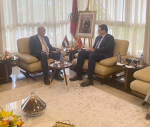You are here
Prince El Hassan calls for establishing regional mechanism for security, cooperation
By Mai Anati - May 01,2025 - Last updated at May 01,2025

Prince El Hassan speaks on Wednesday at the conclusion of a three-day workshop in Amman titled 'Nuclear Security in the Middle East and North Africa: Keeping Pace with an Evolving World (Petra photo)
AMMAN — HRH Prince El Hassan, chairman of the Higher Council for Science and Technology (HCST) called for the creation of a regional mechanism for cooperation and security, based on shared humanity, pluralism and the geopolitical realities of the Middle East.
His remarks came on Wednesday at the conclusion of a three-day workshop in Amman titled “Nuclear Security in the Middle East and North Africa: Keeping Pace with an Evolving World”.
The event was organised by the Jordan Atomic Energy Commission in partnership with the Nuclear Threat Initiative (NTI) and the International Atomic Energy Agency (IAEA).
Prince El Hassan said that regional cooperation is not only a strategic requirement but also a moral obligation.
He stressed the need for a broader, more connected understanding of security — one that includes water, energy, food and the environment.
“Nuclear safety cannot be addressed in isolation,” he said, “but must be part of a wider dialogue on sustainable development”.
He also emphasised that the future of nuclear and human security relies on science, cultural understanding, and communication across generations.
During the closing session, NTI vice president for nuclear materials security, scott Roecker, and IAEA director of nuclear security, Elena Buglova, both highlighted the importance of regional collaboration, knowledge sharing, and joint planning to improve nuclear security and promote regional stability.
In a joint statement issued at the end of the workshop, Prince El Hassan and NTI CEO Dr Ernest J. Moniz, who is also a former US secretary of energy, stressed the urgent need for international cooperation to manage nuclear risks.
“Nuclear security challenges cross borders,” the statement read, “and require action built on trust and cooperation”.
The statement described the workshop as a historic first for the region, focused on managing sensitive nuclear materials in a complex and fastchanging geopolitical environment. It praised Jordan’s leadership in hosting the event and its recognised role as a regional centre for peaceful nuclear technology training.
The discussions focused on the peaceful use of nuclear energy as a way to enhance security and stability. The IAEA acknowledged Jordan’s growing role in training newcomer countries in the safe use of nuclear technologies.
The workshop, the statement added, was a rare opportunity to highlight nuclear energy priorities from the Middle East to the wider world — especially since nuclear security summits have been largely absent from the region, unlike major climate forums such as the COP meetings.
With nuclear energy expected to grow as a tool for addressing climate change and energy security, the ideas presented at the workshop offer a responsible roadmap for safe expansion.
The regional vision discussed in Amman also highlighted the importance of the Water-Energy-Food-Environment (WEFE) Nexus as a tool for building long-term peace and sustainable development.
“The WEFE approach offers a holistic way to stabilise the region through cooperation rather than conflict,” the statement said, adding that this initiative could serve as a model for other regions facing similar challenges. “We encourage world leaders to adopt this spirit of cooperation,” the statement concluded.
“Let the work achieved here in Amman be a starting point for deeper partnerships. Together, we can ensure nuclear technologies are used safely and sustainably— and reduce risks through shared commitment, dialogue, and mutual respect.”















